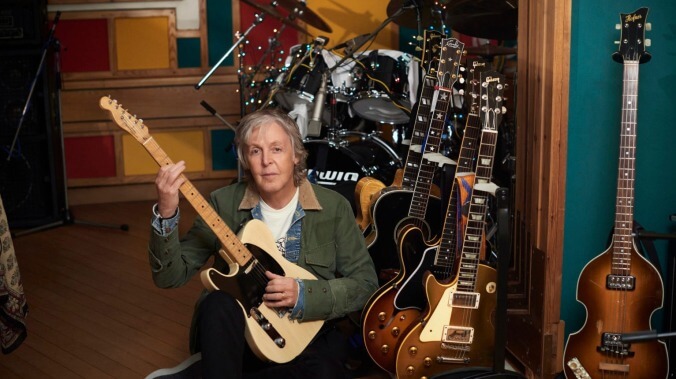With McCartney III, Paul McCartney offers lessons from a legendary life

As the world turns inward, trapped inside in various stages of pandemic quarantine, numerous songwriting luminaries (often blessed with their own in-home studios) have tried to use the downtime creatively—from Millennial stars like Taylor Swift and Ariana Grande to longtime veterans like Bruce Springsteen and Elvis Costello. They’re now joined by Sir Paul McCartney, completing a trilogy of one-man band, one-name albums with McCartney III. The former Beatle wrote, recorded, and produced the album on his own at his estate in Sussex, with vintage equipment that included a double bass once played by Elvis Presley sideman Bill Black, a mellotron from Abbey Road Studios, and—of course—his own Hofner violin bass.
We’ve learned the prospective danger of Macca noodling around in the studio from McCartney III’s predecessors—“Wonderful Christmastime” came out of the McCartney II sessions, after all. And a few of the new album’s tracks embody that was-probably-more-fun-to-play-than-it-is-to-listen-to quality, like the meandering, repetitive, and oddly similar “Deep Down” (nearly six minutes long) and “Deep Deep Feeling” (which features eight minutes of un-engaging relationship rambling, with an especially cruel fake ending around the seven-minute mark). And the bluesy schoolyard taunt of “Lavatory Lil” isn’t about to take the reins from “Lovely Rita” anytime soon. At least the mostly instrumental kickoff “Long Tailed Winter Bird” offers a hooky acoustic guitar riff you can’t blame McCartney for hanging on to as long as he does.
Fortunately, midway through the record, McCartney III starts to soar. When he’s not pouring his heart out into silly love songs, McCartney fares best harnessing his seldom-seen inner rage, à la “Helter Skelter.” In the stormy “Slidin’,” McCartney effectively rants, “I know there must be other ways of feeling free / But this is what I wanna do / who I wanna be.” He’s gliding through the air, wanting to fly, Icarus-like, but “I know that I could die trying.” That track’s ambitious grit is wisely followed by the “The Kiss Of Venus,” a romantic acoustic number that evokes the delicacy of “Yesterday” or “Blackbird”—“The kiss of Venus has got me on the go / She’s put a bullseye in the early morning glow”—and it sure sounds like that historic mellotron comes into play.
The metaphor of birds and flight used in “Slidin’” is prevalent throughout McCartney III, and as the icon is now 78, it makes sense that he’d use this creative time to not just look back, but try to craft a glimpse ahead, into the unknown. It doesn’t take much to decipher that the “Long-Tailed Winter Bird” of the leadoff track is himself; that song’s bookend, closer “Winter Bird—When Winter Comes,” is an acoustic track so cozy you can picture McCartney’s the farm where it was recorded, down to the meadows and rivers he carefully depicts in a lyrical delivery that can only be described as “obviously smiling”: “When summer’s gone / We’ll fly away / And find the sun / When winter comes.”
Of course, with those decades of life come many hard-won lessons, and at this stage of the game, McCartney’s not above preaching a bit. Fortunately, his trademark melodious pop makes these adages pretty easy to take, like in the catchy “Seize The Day,” which stresses the importance of just being a nice person while taking advantage of every moment you’re lucky enough to get: “When the cold days come / And the old ways fade away / There’ll be no more sun / And we’ll wish that we had held on to the day.” And although the lyrics in “Find My Way” (“I can find my way / I know my left from right / I know my way around / I walk toward the light”) seem insipid on the surface, a closer listen to the lyrics (paired with a sunny surf guitar reminiscent of the best of Wings) reveals that it’s McCartney sternly reminding himself to stay on course in his latter decades. In “Women And Wives,” he’s admonishing the rest of us: “Hear me women and wives / Hear me husbands and lovers / What we do with our lives / Seems to matter to others”; while the song ultimately has a hopeful tinge as McCartney urges each generation to teach compassion to the next, the song’s piano-led nostalgic melancholy is undeniable.
The two McCartney albums before this one both capped off significant eras in his life—his first solo releases, respectively, after the breakups of The Beatles and Wings—causing some speculation that McCartney III could mark the end of his recording career. For a musician as continually prolific as McCartney (this is his 18th solo record), that seems unlikely. But if it is indeed a swan song, McCartney III will stand as a proper coda for the singer-songwriter we’ve been listening to for fifty-odd years: sentimental yet strong, a bit wistful, but as always, looking ahead.